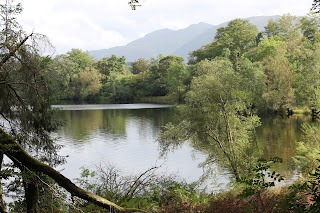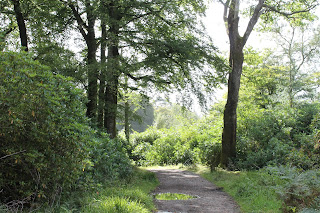 In his earlier1929 trip, described by him in his book 'In Search of Scotland', Morton had travelled a route from Jedburgh to Edinburgh, St Andrews and Aberdeen, topped Elgin and Inverness, cutting down to Fort William and on to Skye, returning through Glasgow, Ayr and Dumfries. His second trip in 1933 took him clockwise from Dumfries, Galloway, Arran, Mull, Fort William, Inverness, then right the way across the north coast of Scotland to Wick, returning via Inverness, Pitlochry, Aberdeen, Dundee, Stirling and Edinburgh - to Carter Bar and the border.
In his earlier1929 trip, described by him in his book 'In Search of Scotland', Morton had travelled a route from Jedburgh to Edinburgh, St Andrews and Aberdeen, topped Elgin and Inverness, cutting down to Fort William and on to Skye, returning through Glasgow, Ayr and Dumfries. His second trip in 1933 took him clockwise from Dumfries, Galloway, Arran, Mull, Fort William, Inverness, then right the way across the north coast of Scotland to Wick, returning via Inverness, Pitlochry, Aberdeen, Dundee, Stirling and Edinburgh - to Carter Bar and the border.Reading 'In Search of England' back in the early 1980's, I little realised that I would attempt to recreate at least part of Morton's travels. Last year in a little bookshop in Wigtown Dumfries, I rediscovered H V Morton, hidden amongst dusty books on the bottom shelf. And so my love affair with Morton was rekindled.
Those who know me will know that I have some advantages over Henry Morton: a 200 mile start - leaving Darlington in Co Durham, rather than a Queen Anne square in central London; a network of fast roads leading to the Highlands; and rather than a pre-war Morris 'small but experienced motor car', a 2015 Auto Trail Tracker motorhome.
Given those advantages, my account here is set against the penalties of twenty first century life - the rash of civilisation, the huge population increase, the ubiquitous internal combustion engine, a loss of community, and with them, the death of an era.
It is Thursday 1 September 2016. Stephanie (in 'khaki shorts') and I leave Darlington in the motorhome, equipped with waterproofs, walking boots, a map and H V Morton. This time, he will be a passenger, to brave our company, tucked in the book rack . We head not north, but strike out west on the A66 route via Bowes and Brough to Westmorland and Cumberland. Our aim is the M6 at Penrith, and on to Carlisle - where Morton's second adventure starts.
Carlisle, once a key town on the road to the western Highlands, now lies shortly to the west of the motorway, avoiding Scottish travellers. Within moments the signs appear, then recede in the rear view mirrors. and so we progress towards the A74M. Stephanie looks wistfully at the signs for Gretna, and I, remembering Earl Edward Gibbon Wakefield, cough self-consciously, taking instead the A75 Dumfries road into 'the strong land of Galloway'. Between Gatehouse of Fleet and Creetown, the road hugs the coast and the joy of this still undiscovered 'heavenly country' of Scotland emerges.
To the west, Wigtownshire - the peninsula that descends south to the Isle of Whithorn, is an area of considerable delight. Leaving the A75 by Newton Stewart, the A714 heads down through Wigtown towards Garlieston. Here the strong land softens as one skirts the bay projecting to the Irish Sea. It is not yet the land that time forgot, but rests a good couple of decades behind middle England. Morton described it as 'infinitely remote', and save for the House Martins, Sand Martins, Swallows and Swifts that hurtle overhead, and the speeding local bus that races the clouds along narrow but straight roads, the pace of life slows.
Wigtown, now the book town of Scotland, is perhaps less solemn than that found by Morton. Almost every shop, café and pub contains books to buy or simply to borrow. It still boasts its huge square, leading down, passing the church, to the dead harbour below where in 1685 Wigtown Martyr Margaret Wilson was drowned. Today, close boarded walkways lead out into the fen to the stone to which she was chained and left for the tide. Perhaps here Morton's solemnity returns in the desolation of the marsh and the paining memory of lost souls.
The Mull of Galloway is still the 'Land's End of Scotland'. It is here at New England Bay, south of the Sands of Luce, that we camp for our first night. Slipping from the road, the site lies against the bay. We pitch short of the gorse covered rocks and dunes. This is a land of seals and Osprey. Linnets and Goldfinches search for seeds and Whitethoats dart for cover. As the sun sinks behind us, the lights of a tethered tanker flicker out in the bay. Our Scottish return with Henry, has begun.

































